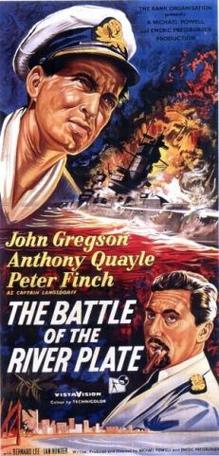In the early years of World War II, Germany ruled the seas as its enemies jumped into a new age of naval warfare. The battleship Bismarck was the most infamous example of German firepower on the high seas, a ship that terrorized Allied shipping. Another example -- a significantly lesser-known one -- is the pocket battleship Graf Spee, a cruiser dubbed a battleship that caused an international sensation late in 1939, a story told in 1956's Pursuit of the Graf Spee.
As 1939 comes to a close, British merchant marine Captain Dove (Bernard Lee) sees his ship sunk by a German cruiser, the Graf Spee, that is gaining notoriety around the world for its ability to disrupt Allied shipping. On board the German cruiser, Dove meets its captain, Langsdorff (Peter Finch), who tells him that he will be kept with other prisoners until they can be dealt with. The days and weeks pass though and Dove is joined by countless other prisoners who tell him a rumor of coming trouble. The British are sending a three-cruiser convoy in pursuit to hunt down the infamous German warship. Outnumbered but not necessarily outgunned, the Graf Spee is ready for a battle, but the coming fight involves more than either side was planning for, including international negotiations and intrigue.
From directors Michael Powell and Emeric Pressburger, 'Pursuit' is an interesting movie, but for reasons I really didn't see coming. A forerunner of 1960s/1970s WWII movies like Midway, The Longest Day, A Bridge Too Far, Tora Tora Tora, this British-made film plays like a documentary at times. Big, expansive story telling a true historical battle and a big impressive cast set the backdrop. What I was most impressed with was the use of real ships that give the story a sense of authenticity and realism. There are some truly impressive shots of these immense, destructive warships at sea, and some equally enjoyable shots of cast and crew on-board these ships.
Beyond that though, the movie stays on a superficial for its first half of the 119-minute running time. It gets bogged down quickly in the details and the naval tactics of the history. It's apparently very accurate, but that doesn't make the story interesting to watch. The commander of the cruiser convoy (Anthony Quayle) sits down with his ship commanders and explains what their plan of attack is. Then we see the attack after an excruciatingly long segment of the ships scanning the horizons for the Graf Spee that plays in real-time (seemingly of course). The actual battle is ships miles away from each other just blasting away at each other. While we see the effects as the shells land and tear the ships apart, it is far from exciting to watch. I never felt emotionally or personally invested in the story that sticks to close to its quasi-documentary style.
After the slow-moving naval intro that never really caught my attention, 'Pursuit' finally picked up pace in the second half when it takes a surprising turn. Severely damaged in the battle, the Graf Spee makes a beeline for the neutral harbor of Montevideo with the British not far behind. What follows is an interesting twist of that international intrigue as the Uruguayan government (including minister Peter Illing) decides what to do with the situation as several foreign ministers (Anthony Bushell = British, Douglas Wilmer = French, John Chandos = German) try to get their two cents in. At the same time, intelligence agents (Michael Goodliffe and William Squire) attempt to decipher what the Germans will do. An American radio rep (Lionel Murton) for NBC describes the action from shore as huge crowds gather on the beaches and docks to see what happens. The story just plays differently, and it plays well with a change of pace.
The overall casting has its positives and negatives. 'Pursuit' features a lot of impressive names, but like the early goings in the story, it has a superficial feel to it. The naval battle is especially affected in negative fashion, faceless sailors in white yelling amidst smoke and chaos. The captains of the British cruisers include John Gregson, Ian Hunter and Jack Gwillim with Patrick Macnee as one of their subordinates. Also look for Christopher Lee as Manolo, a passionate Uruguayan bar owner who bothers Murton's radio man, with Donald Moffat as a signalman in his film debut, and Anthony Newley and Nigel Stock with small, uncredited supporting parts. I wanted to like this one more, but it's too uneven and missing that special something (energy is my final verdict) that brings a movie up a notch. The second half is considerably better so stick with it for the payoff.
Pursuit of the Graf Spee (1956): ** 1/2 /****


This squares with my memory of the film. Good review.
ReplyDelete